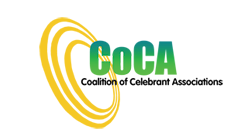First Assistant Secretary
Civil Justice Policy and Programmes Division
Attorney-Generals Department
Address: 3–5 National Circuit
Barton ACT 2600
Wednesday 9th November 2017
Re: Stakeholder Consultation processes
Dear Cameron
Thank you for the opportunity to provide feedback on how our CoCA associations and CoCA itself may improve our consultation with the department.
Preamble
CoCA takes seriously its role as a peak body representing all celebrants to the best of our ability and maintaining the professionalism of celebrancy.
CoCA’s primary aim is to “engage effectively with the Attorney-General and the Attorney-General’s Department (AGD) to represent the marriage celebrant community on matters relating to the Marriage Celebrants Program (the Program)”. “In doing so, CoCA will work to ensure that it represents the views of those marriage celebrants who are members of celebrant associations, as well as those who are not.”1
While understanding the logistical benefits of inviting non CoCA organisations to stakeholder meetings, CoCA considers that the department should ensure that other organisations as a minimum, meet the criteria for CoCA membership i.e. incorporation and have 50 members – even if they choose not to join the peak body itself.
CoCA also considers that the Stakeholders meetings or working parties should be used to resolve important issues where there appears to be conflicting positions held by CoCA celebrant associations and non-CoCA associations. That way the long-term consequences of changes to the Commonwealth Marriage Celebrant Program should ensure that the marrying public and Commonwealth celebrants are not adversely affected but provided with the highest quality professional services and support.
Key Consultation Points:
<1. CoCA considers it is essential that we continue to meet face to face on a regular basis (at least twice a year) with the department to discuss issues.
<2. CoCA recommends consultation dates, especially stakeholders meetings, be finalised with plenty of lead up time to enable delegates to book cheaper flights and secure accommodation or have their diaries free for teleconferencing.
<3. Likewise, CoCA recommends agenda items, statistics, supporting documents etc, be provided in a timely manner to enable delegates to consult with their respective associations’ committees and membership, as well as the broader celebrant community via the CoCA Celebrant News and the Feedback Section of the CoCA website.
As a coalition of volunteer delegates, obtaining a majority position on issues can be time consuming even with the technology CoCA uses. As some association committees only meet bi-monthly or monthly, it takes time for delegates to discuss issues within their own associations and make recommendations. One week turn around as has been common in the past for some issues or the day prior to our meeting with the department is not practical.
<4. CoCA suggests each meeting could have one (or more) significant and longer term topic/s or themes to discuss in depth with discussion papers circulated well ahead of the meeting. The idea of "guest speakers" also could be informative for associations and the department.
<5. CoCA would like to see the department inviting CoCA to nominate representatives to Canberra for working parties on their various projects - for example, consultation on the forms, review of the guidelines, review of the Regulations. All of which would have been helped by some early focused discussion that took account and both the department’s and associations’ priorities.
<6. CoCA recommends CoCA representatives be included in meetings with other stakeholders such as the ongoing professional development providers, Births, Deaths and Marriages Registrars and other working groups where outcomes impact upon marriage celebrants.
<7. CoCA recommends there be some agreed "review points" during major projects. The COI and B2B policy was an example where the department took initial comments and then published its final position, without further consultation. This approach meant there was no possibility of further input or discussion of any unforeseen consequences of the policy.
Review points should always include a circulation of a final draft to iron out any final concerns - however ongoing consultation should minimise last minute concerns. In recommending this CoCA appreciates that “the Attorney-General is the final decision-maker in matters relating to the Program and therefore plays an important role in seeking and considering CoCA’s feedback or concerns”.2
<8. CoCA recommends that the Department gives CoCA feedback on the advice/information offered. Too often in the past, it seems CoCA’s input has been ignored. It would be helpful if CoCA knew whether its advice was ignored or rejected (and the reasons). CoCA realises that it is not aware of all the drivers that influence the department’s decisions and we see things from our own prism, so better feedback would improve consultation and increase mutual understanding.
<9. While phone meetings/video conferencing can be difficult to manage and can be frustrating, they may work for some discussions, such as working parties on specific topics or including a delegate who would otherwise have significant travel and accommodation expenses.
Technically this should prove increasingly possible, perhaps starting with smaller groups than our full round table.
<10.CoCA recommends that departmental staff pick up the phone and give CoCA office bearers a call when urgent or limited consultation issues require some CoCA input. For example, a quick call would have resolved the issue of the missing feedback on the Regulations.
<11.As CoCA works “to ensure that it represents the views of those marriage celebrants who are members of celebrant associations, as well as those who are not “, it would be helpful for the department assist CoCA with updated newsletter mailing lists of registered celebrants twice yearly in assisting to consult with the broader celebrant population. CoCA would give assurances that the mailing list would only be used by CoCA (via its website) and not by individual associations.
It takes considerable work for CoCA volunteers to draw an accurate mailing list off the department’s website.
<12.Whilst CoCA appreciates the advice the department has provided, CoCA considers that it must continue to press for some funding to attend meetings with the department.
Other Departments such as the Department of Veteran Affairs, pay for their consultative forums. By funding our attendance as delegates, members of CoCA associations are subsidising all the celebrants who do not belong to associations. By paying our expenses from the annual fees the department could be spreading that cost of consultation over all subdivision C celebrants. In turn, CoCA associations would continue to engage beyond our own associations’ members as CoCA has a good track record of doing - through CoCA surveys, monthly newsletters, maintaining a CoCA website in addition to our own association sites etc.
CoCA would also like to thank both yourself and the department for its time to meet with CoCA’s Chair and Vice-Chair at short notice on Thursday, 26 October 2017. Both Dorothy and Liz appreciated the opportunity to clarify issues and to state the importance of face to face consultations continuing into the future.
Yours sincerely
Rona Goold
Secretary
Coalition of Celebrants Association (CoCA) Inc.
http://www. coalitionofcelebrantassociations.org.au
Mail: The CoCA Secretary
PO Box 3113 Robertson NSW 2577
Phone: 02 4885 2393
Email: This email address is being protected from spambots. You need JavaScript enabled to view it.
References
<1. Protocol between CoCA and Attorney General’s Department. Section 2
<2. Protocol between CoCA and Attorney General’s Department. Section 5


